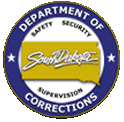Frequent Questions
Parole
What is parole?
Parole is the discretionary conditional release of an inmate from actual penitentiary custody before the expiration of his term of imprisonment.
What is the difference between being paroled and being released from prison?
When an inmate is released from prison upon completing their sentence, they are not under state supervision. When an inmate is paroled, they remain under the supervision of parole services.
Are inmates sentenced to life sentences eligible for parole?
No. In South Dakota, life means life. Inmates sentenced to life in prison serve the rest of their life in prison unless their sentence is reduced to a number of years.
I've heard about different parole systems in South Dakota. What is the difference?
The "old" system applies to state prison inmates who were convicted and sentenced for a crime committed before July 1, 1996. Under this system, the Board of Pardons and Paroles has discretion over whether an inmate is released on parole based on a variety of factors, including whether they believe the inmate has served long enough to be rehabilitated, are not a threat to society and if they have a parole plan (including having a job and place to live lined up) in place for when they're released.
Under the "old system", an inmate is eligible for parole after deducting from his sentence the statutory time granted for good conduct:
- If convicted of a felony for the first time, when he has served one-fourth of the time remaining;
- If convicted of a felony for the second time, when he has served three-eighths of the time remaining; or
- If convicted of a felony three or more times, when he has served one-half of the time remaining.
The "new" system applies to those inmates who were convicted and sentenced for a crime committed on or after July 1, 1996. Each inmate is given an Individual Program Directive (IPD), which is developed consistent with the inmate's time to serve, classification and programming/treatment needs. The IPD establishes standards and criteria for the inmate's initial parole. If the inmate behaves while incarcerated and successfully completes the work, education and treatment programs, has agreed to conditions of supervision and has an approved parole release plan, then they will be released at their initial parole date.
Any inmate whom the warden reports has not substantively complied with the individual program directive has a hearing with the board to determine the inmate's compliance with the individual program directive.
The board may determine the inmate has substantively complied with the individual program directive and release the inmate at the inmate's initial parole date or as soon as reasonably possible following the initial parole date and hearing. The board may also determine the inmate has not substantively met the requirements of the individual program directive, deny release at the initial parole date and set the time for a subsequent discretionary parole hearing. Any inmate appeal of a finding of noncompliance by the board shall be filed pursuant to chapter 1-26 in the county in which the inmate is confined.
Any inmate not released at the time of the inmate's initial parole date has a discretionary parole hearing at least every two years.
Continued On: Page 2

